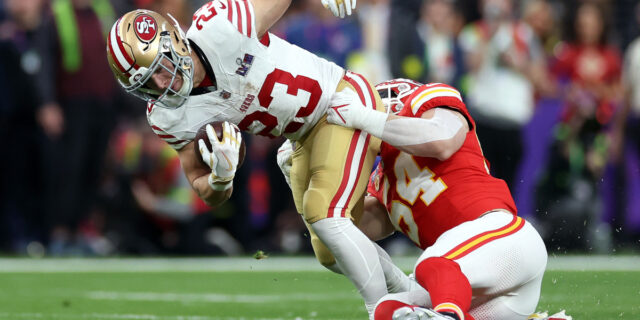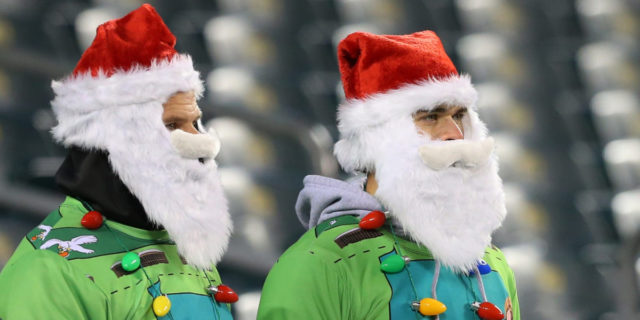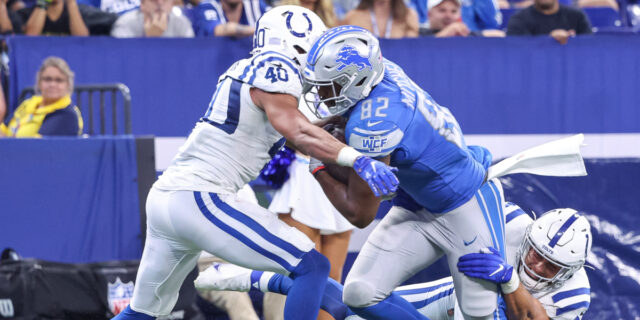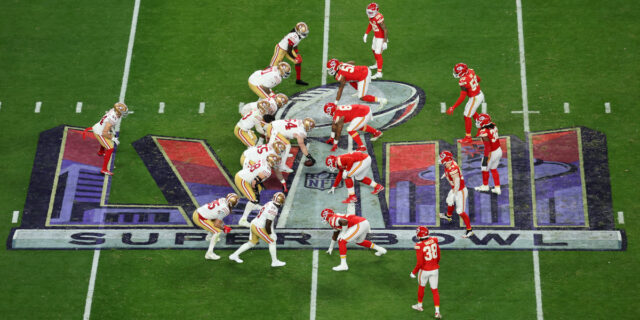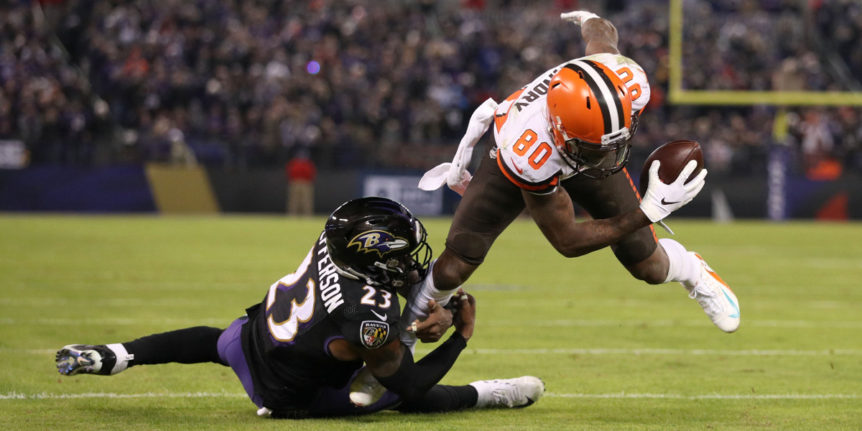
Rags to Riches
“I had an In-N-Out Burger immediately.”
For Tony Jefferson, life’s simpler pleasures are the most enjoyable. It’s why, in the hours after his breakout campaign, while other NFL players were preparing for an offseason of fun ranging from the harmless to illegal, he merely took a trip two miles from home – and consumed the treat he’d spent months reminded of as the intoxicating smell engulfed his nostrils.
“I live about two miles away from that place,” he adds in conversation with Gridiron, “and I’ve been able to smell it all season. I’ve had to fight off the temptation all year, but I couldn’t do it once the season was over! I had it all: the burger, the animal-style fries. Everything. It was awesome.”
That the burger chain quickly spreading from the west coast of America was the first port of call for Jefferson, a pastor’s son with a two-year-old boy, goes some way to explaining why he is about strike it rich.
Life as an NFL player is a unique one, split into two wildly conflicting parts: the season and offseason. The season begins in earnest every July with the opening of training camp, a month-and-a-bit-long marathon of weights, conditioning and practice. Its purpose is to set up the grind of the next six months, when players will endure the 12-hours-a-day grind of film study, practice and pain.
Depending on the quality of your team, the offseason can start anywhere between the beginning of January or early February. And it’s a culture shock. Having been expected in the building every day, barring the odd off day, suddenly players are sent packing for multiple months and restricted from accessing the facility. The day after the final game, whether that be a regular-season fixture or playoff loss, is one of goodbyes: players pack up their lockers, head their separate ways and tenuously say, ‘See you in a few months’.
Tenuously because the NFL is a fickle beast. With coaching changes, free-agency and the draft to come, there are no sure things; what’s true this week might be wildly different the next. In fact, the only certainty is the ensuing months will feature personnel executives and coaches answering every phonecall with bated breath; after all, millionaires with nothing to do and the world as their oyster is a dangerous mix.
In the case of soon-to-be-free-agent safety Jefferson, the suits need not worry. That he managed to get through the entire campaign resisting the urge of a simple burger tells its own story. His commitment to excellence is absolute, and there’s a good reason for it.
“I had loads of people around me, and it was just so embarrassing and totally insulting.”
Jefferson is not short of adjectives as he reflects on that fateful day in 2013. Come Saturday, April 27, the disappointment had already hit. Convinced he was going to be a second-round pick, the Oklahoma standout had already endured three rounds of misery as, surrounded by friends and family, he watched 97 players live out the moment he’d been dreaming of for years. Only worse was yet to come as the unthinkable happened… a third afternoon passed without those fateful words, ‘Team X selects Tony Jefferson, safety, Oklahoma’. Jefferson’s dream had turned into a nightmare as realisation struck: all 32 NFL franchises had passed on him, repeatedly.
“I left college as a true junior and still had another year of eligibility left,” he adds ruefully, “but I’d been given a second-round grade by scouts and the NFL Draft Advisory Board. When you don’t get drafted with that grade, and you had another year of eligibility, there is a lot running through your mind.”
Not that there was any time to reflect. The cut-throat nature of the NFL dictates that there isn’t long to process the disappointment as clubs jostle for position to fill their 90-man camp rosters with an array of rookies like Jefferson who didn’t make the cut. While some are relieved for the second chance, that feeling isn’t universal. “Teams started calling during the seventh round, telling me they liked me as a priority free-agent – but I didn’t even want to hear that. To have guys from front offices on the phone telling you that you basically aren’t good enough to be drafted is horrible.”
Yet for Jefferson, this was his new reality. In the space of three days he’d gone from dreams of riches to fighting for a career that may never pan out. And the fight is very real: only around 30% of undrafted free-agents ever make a full NFL roster and, if most teams are left with a choice between a guy they drafted or one they didn’t come cut day, they’ll usually go with the former.
Not that Jefferson was about to give up on his dream. The disappointment would merely be used as fuel to launch his career. “It’s had a huge impact on my career; I still think about it every day. It’ll haunt me for the rest of my life, and it still gives me that fire on the inside. To be drafted is a really huge accomplishment and, growing up, you think about that moment of being there with your parents and receiving that phone call. But when you’re not getting that call, life comes at you real quick. The percentages of undrafted guys who make it are really low, and having to fall back on your degree is not part of the plan.”
The new plan for Jefferson was simple. After signing a three-year, $1,495,100 contract with the Arizona Cardinals, he’d show his employers – and the rest of the NFL – just how big a mistake they had made. “From the moment I entered rookie minicamp, I was determined to prove all the doubters wrong,” he adds.
If college football has its ‘Heisman moment’, where prospective candidates for the biggest individual honour produce that one play which gets them over the line, most successful undrafted free-agents have their ‘roster moment’. It’s that point where ‘just another guy’ battling with a load of other ‘just guys’ pokes his head above the pack. For Jefferson, the moment – nationally at least – was fairly nondescript. If you read the Associated Press report from the second preseason game of 2013, you won’t see Jefferson’s name until the 17th paragraph that simply states: ‘Rookie Tony Jefferson had two interceptions’.
The impact of those two picks against the Dallas Cowboys was felt around the building in the film-study sessions after the game, as they proved a precursor to a superb rookie campaign. Not only did Jefferson make the roster, he played in all 16 of the Cardinals’ games and started twice. He also landed in a good situation, entering the league alongside third-round cornerback/safety Tyrann Mathieu – both of whom joined star cornerback Patrick Peterson to help form a secondary that has been among the NFL’s best since they joined forces.
“We’ve become a very close-knit group,” reveals Jefferson. “Pat and Tyrann, we were all here when the new coaching staff came in and have been together for four years. We’ve experienced good, great and bad seasons together; it’s an emotional rollercoaster during the season – and that’s when you start bonding.
“The three of us have been together for so long and we’re close. It’s a great unit to play in. You know that they’ll take care of their business; they’re high-energy guys and playmakers and it heightens your game to play on their level.”
Playing with players of Peterson and Mathieu’s ilk, as Jefferson admits, can undoubtedly improve your own game. However, it can also have an adverse impact as a good player gets lost in the plaudits that are thrown his colleagues’ way. For the majority of Jefferson’s career, that’s been the case.
Until this season.
The build-up was interesting. As a restricted free-agent, Jefferson was handed a ‘low’ tender of just $1.67 million – basically allowing any team to offer him an improved deal that Arizona would either match, or refuse and allow him to walk. “A lot of teams don’t like to mess with it. There were a lot of interested teams who tried to work something out but it didn’t happen.”
The other 31 teams refusing to bite meant Jefferson entered a defining campaign with a his $1.67million agreement, more than his combined earning over the previous three seasons but still a long way shy of the richest contract handed to a safety: ironically, the $12.5million-per-year, $62.5million deal signed by teammate Mathieu in August. It was make-or-break time. “I knew I was coming back to a situation where I knew this system and, if I took the next step, I could make this thing happen in free-agency this year.”
Jefferson adds: “In the offseason, I really focused on the mental aspect of preparing like a pro and doing all of the little things. I was doing that before, but I think I took that extra step this year. I was at work at 6am every morning, getting my rehab in and taking care of everything, physically and mentally. Once you take care of the little things, the bigger stuff takes care of itself.”
The work paid off. Jefferson elevated his game to an elite level in 2016, stepping out from the shadow of his illustrious teammates to make his own name. He finished the year ranked as Pro Football Focus’ fifth-best safety and enters free-agency as one of the key names to watch. He’s about to strike gold. “It’s a blessing but, at the same time, I feel like that all the hard work and determination that has gone into it, it’s earned.”
Where the future lies remains to be seen. Jefferson admits he’d like to stay in Arizona, but that looks tricky. “We have been talking, but it’s tough,” he admits. “This is like home for me now. I’ve been here for four years, and this is the team that gave me an opportunity, so I’ll always love it here. But, at the end of the day, I’ve got to do what’s right for me and my family.”
Peterson and Mathieu are already signed through 2020 and ‘21 respectively and Arizona have other guys at positions less stocked than the defensive backfield, like pass-rusher Chandler Jones and stud defensive lineman Calais Campbell, also hitting the market. The salary cap dictates that economics have to work in the NFL and, while Jefferson was arguably Arizona’s best player in 2016, they may have to let him walk.
Jefferson, having reached this point the hard way, knows he must look at the bigger picture. “Make no mistake, this is just a small portion of my legacy. The money is great, but I want to get better each year and continue to be one of the best guys at my position in the NFL. It won’t just be a financial decision but, at the same time, you have to look out for yourself more than anything.”
When the day comes for the contract to be signed, the cheers will be heard all the way from the Jefferson household to the offices of In-N-Out Burger. For that day of true acceptance in the NFL ranks, four years on from his ultimate rejection, will surely be worthy of another burger with animal fries.
This article originally appeared in Issue XXIX of Gridiron magazine – for individual editions or subscriptions, click HERE



